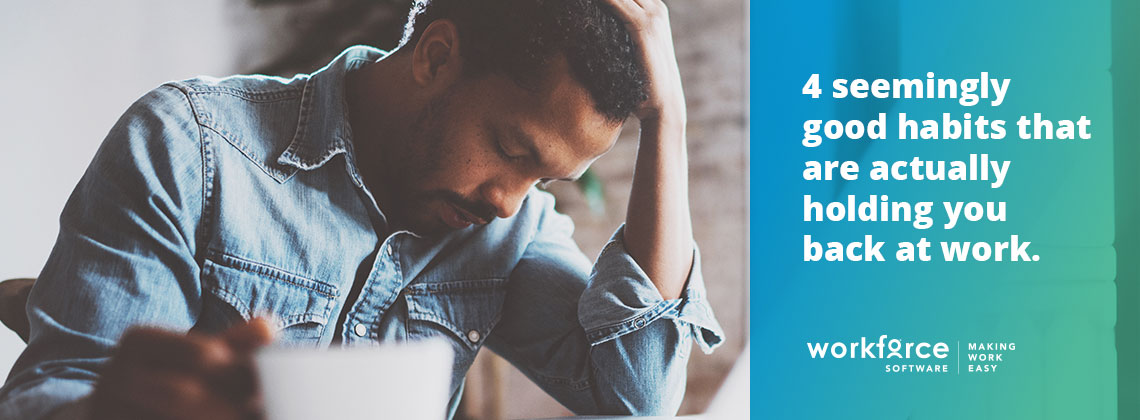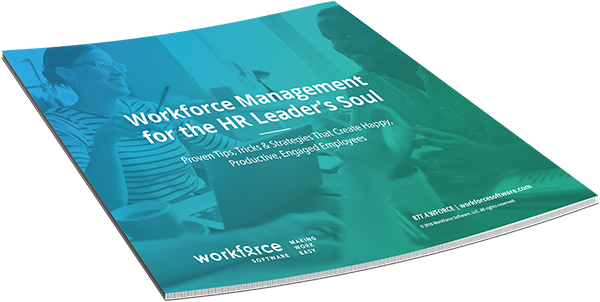How to be Less Productive

You’re a hard worker. Always have been …
Your goal is to deliver exponential value each day. You’re dedicated, driven. You’re growing with the role.
To keep up the pace, you’ve established habits that help you check items off your list ever faster. Habits that have been with you for so long, you can’t remember when or how they ever entered your life. They’re just there. Always have been …
But are they good habits?
That is, do your habits enable productivity?
Or are they holding you back? Are they bad habits masquerading as efficiency hacks?
Let’s find out …
Subscribe to The WorkForce Blog
Learn the art and science of maintaining productive, happy, engaged employees.
How to be less productive:
Well-intentioned behaviors can sometimes carry hidden, negative consequences.
For example, if you:
1. Look at a screen before bed.
You may do this all the time, possibly every night. You plump your pillow, climb in bed, and promptly reach for your phone or iPad or laptop:
- You check your email.
- You draft tomorrow’s to-do list.
- You read an article on LinkedIn.
Whatever you’re working on feels productive, like you’re getting a head start. But you’re not …
If anything, you’re doing more harm than good, sabotaging your short-term productivity and long-term health.
The problem:
Two words: Blue light.
Exposure to blue light hinders your brain’s ability to produce melatonin, a sleep-inducing hormone.
Morning rays from the sun are packed with blue light, which wakes you up. As the day wanes, so does the amount of blue light coming from the sun. This gradual decline correlates with your melatonin production, steadily bringing you down throughout the day.
But the sun isn’t your only source of blue light. It’s also emitted from the screen on your phone, tablet, and computer. That’s why looking at a screen before bed stops your melatonin production, giving you energy when you’re actually trying to shut down.
This can cause restlessness, which creates grogginess in the morning and fatigue throughout the day. So much for being productive …
The solution:
You can apply a blue light filter to your phone, but that doesn’t block it out completely.
The simplest approach is self-restraint: If you’re in bed, don’t look at a screen. Make it a rule.
Instead, wind down with a book or magazine, something that doesn’t emit light. Although TV, from a distance, also won’t interfere with your melatonin production.
2. Aim for perfection.
Your approach is all or nothing.
You always say, “If it’s not perfect, it’s not done.” That’s what holding yourself to a high standard is all about … right?
The problem:
An all-or-nothing mindset isn’t realistic, much less productive. In fact, research shows that perfectionism puts people on the fast track to burnout.
Over time, the weight of high expectations can also induce stress and anxiety, which can lead to procrastination. So much for being productive …
The solution:
As a perfectionist, you may struggle with self-doubt, a habit that makes it difficult to set objective expectations. Breaking this habit starts by acknowledging its existence.
Only then can you begin to set reasonable, objective goals for yourself. Only then can you begin to accept that perfection and success are mutually exclusive.
 Workforce Management for the HR Leader’s Soul
Workforce Management for the HR Leader’s Soul
This book will help you create a healthy, rewarding environment for the people that keep your company moving forward.
3. Answer emails immediately.
You’re responsive, on top of it. Nothing gets by you. Nothing gets put off.
You’ve established the professional expectation that emails will be answered quickly – if not immediately – because that’s what productive colleagues do … right?
The problem:
Every time you stop working to check your email, your brain fills up with something scientists call attention residue. In fact, this applies to any form of multitasking.
“Attention residue represents the extent to which a person’s attention is only partially focused on a current activity because a prior activity is still holding part of his or her attention,” explains Sophie Leroy, who published research on the subject. “More precisely, that prior activity has stayed active in the working memory—up through the present—and keeps attracting attention even though one has had to engage in another activity.”
In other words, you subconsciously continue to think about what you’ve read or seen long after the moment has passed. These lingering thoughts stifle your brain power, distracting you and slowing you down. So much for being productive …
The solution:
Schedule periods of undisturbed, complete concentration, also known as deep work.
Deep work will keep your mind free of attention residue, allowing for maximum focus and productivity.
Bad habits can derail your productivity.
Good habits, of course, can enable it.
Learn about productive working habits here.

 Workforce Management for the HR Leader’s Soul
Workforce Management for the HR Leader’s Soul